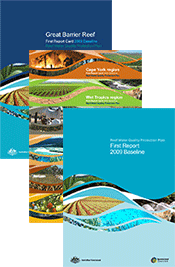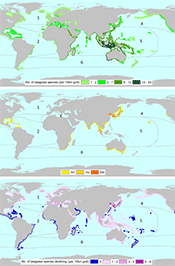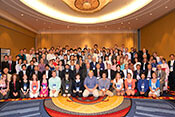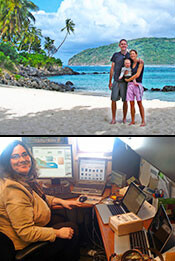Great Barrier Reef Report Card
 The Great Barrier Reef is the largest and best-known coral reef ecosystem in the world. This first report card provides an estimate of the status of the key indicators for the period preceding 2009. It is based on historical data and trends and takes into account the influence of a variable climate from year to year. This serves as a baseline that will be used as a point of comparison to measure progress towards Reef Plan goals and targets. This report card (and the accompanying regional summaries and technical report documents) presents results up to 2009 and therefore does not include the effects of Cyclone Yasi and the more recent flood events which will be presented in subsequent reports. For additional details on the GBR report card, see the Reef Plan Report Card website.
The Great Barrier Reef is the largest and best-known coral reef ecosystem in the world. This first report card provides an estimate of the status of the key indicators for the period preceding 2009. It is based on historical data and trends and takes into account the influence of a variable climate from year to year. This serves as a baseline that will be used as a point of comparison to measure progress towards Reef Plan goals and targets. This report card (and the accompanying regional summaries and technical report documents) presents results up to 2009 and therefore does not include the effects of Cyclone Yasi and the more recent flood events which will be presented in subsequent reports. For additional details on the GBR report card, see the Reef Plan Report Card website.
Extinction risk assessment of the world's seagrass species
 Recently published in Biological Conservation, 144(7): 1961–1971, this paper describes the the probability of extinction for the world's seagrass species under the categories and criteria of the International Union for the Conservation of Nature (IUCN) Red List of Threatened Species. The focus was to determine the risk of extinction for individual seagrass species, a four-year process involving seagrass experts internationally, compilation of data on species' status, populations, and distribution, and review of the biology and ecology of each of the world's seagrass species. Ten seagrass species are at elevated risk of extinction (14% of all seagrass species), with three species qualifying as Endangered.
Recently published in Biological Conservation, 144(7): 1961–1971, this paper describes the the probability of extinction for the world's seagrass species under the categories and criteria of the International Union for the Conservation of Nature (IUCN) Red List of Threatened Species. The focus was to determine the risk of extinction for individual seagrass species, a four-year process involving seagrass experts internationally, compilation of data on species' status, populations, and distribution, and review of the biology and ecology of each of the world's seagrass species. Ten seagrass species are at elevated risk of extinction (14% of all seagrass species), with three species qualifying as Endangered.
Global Summit on Coastal Seas conference
 The ninth Environmental Management of Enclosed Coastal Seas (EMECS) conference was held in Baltimore, Maryland in late August. IAN helped sponsor the conference, which was attended by over 300 scientists and resource managers from 25 countries, in spite of global financial uncertainty and Hurricane Irene. The conference theme was ‘Managing for results in our coastal seas,’ and both past and present IAN staff presented a variety of topics throughout the conference. At the opening plenary, Maryland Governor Martin O’Malley presented his BayStat approach, highlighting the Chesapeake Bay report card produced by EcoCheck, the UMCES/NOAA partnership based in Oxford, Maryland.
The ninth Environmental Management of Enclosed Coastal Seas (EMECS) conference was held in Baltimore, Maryland in late August. IAN helped sponsor the conference, which was attended by over 300 scientists and resource managers from 25 countries, in spite of global financial uncertainty and Hurricane Irene. The conference theme was ‘Managing for results in our coastal seas,’ and both past and present IAN staff presented a variety of topics throughout the conference. At the opening plenary, Maryland Governor Martin O’Malley presented his BayStat approach, highlighting the Chesapeake Bay report card produced by EcoCheck, the UMCES/NOAA partnership based in Oxford, Maryland.
IAN staff transitions
 Dr. Tim Carruthers, the first IAN Science Integrator and then the first IAN Program Manager, has moved with his family to Apia, Samoa in the central Pacific Ocean (see blog post for more details). Tim is serving as the Coastal and Marine Advisor to the Secretariat of the Pacific Regional Environment Programme. Tim worked with IAN from 2002–2011, and was involved in virtually every aspect of IAN. In his new position, he is actively developing collaborative projects with IAN. Joanna Woerner, IAN intern and then IAN Science Communicator, has moved to Indianapolis, Indiana to work as the Web and Social Media Analyst at Indiana University Health. Joanna worked with IAN from 2006–2011 and in that time she produced newsletters and books, created IAN Press, and launched the UMCES SchoolTube Channel. We wish both Tim and Joanna the best in their new career paths and look forward to future collaborations and interactions.
Dr. Tim Carruthers, the first IAN Science Integrator and then the first IAN Program Manager, has moved with his family to Apia, Samoa in the central Pacific Ocean (see blog post for more details). Tim is serving as the Coastal and Marine Advisor to the Secretariat of the Pacific Regional Environment Programme. Tim worked with IAN from 2002–2011, and was involved in virtually every aspect of IAN. In his new position, he is actively developing collaborative projects with IAN. Joanna Woerner, IAN intern and then IAN Science Communicator, has moved to Indianapolis, Indiana to work as the Web and Social Media Analyst at Indiana University Health. Joanna worked with IAN from 2006–2011 and in that time she produced newsletters and books, created IAN Press, and launched the UMCES SchoolTube Channel. We wish both Tim and Joanna the best in their new career paths and look forward to future collaborations and interactions.

